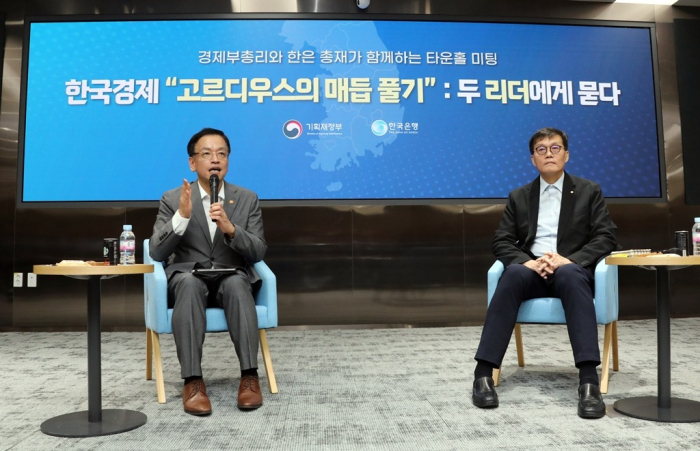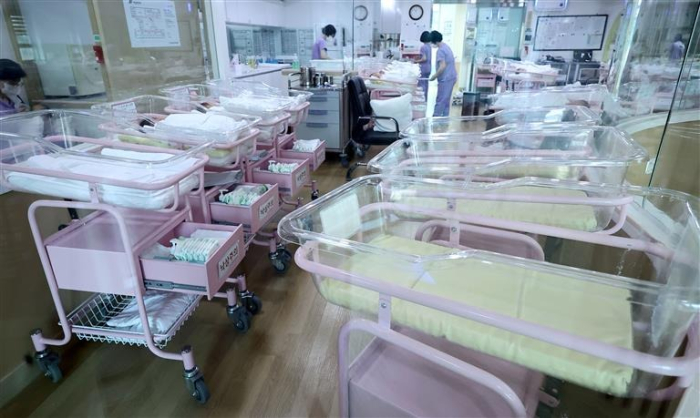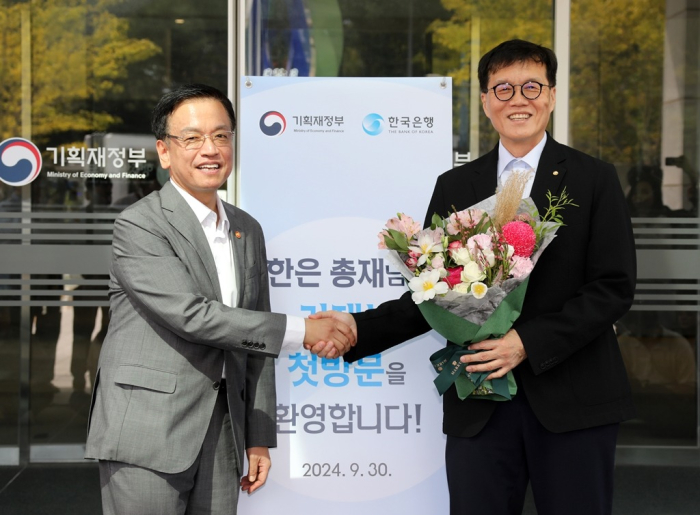Korea’s finance min, central bank chief to take on demographic crisis
BOK's Rhee, the first South Korean central bank chief to visit the finance ministry, discusses structural reform with Minister Choi
By Sep 30, 2024 (Gmt+09:00)
LG Chem to sell water filter business to Glenwood PE for $692 million


KT&G eyes overseas M&A after rejecting activist fund's offer


Kyobo Life poised to buy Japan’s SBI Group-owned savings bank


StockX in merger talks with Naver’s online reseller Kream


Meritz backs half of ex-manager’s $210 mn hedge fund



South Korea’s finance minister and central bank chief on Monday agreed to address the world’s lowest fertility rate, a most urgent task for the nation, to maintain the long-term growth momentum of Asia’s fourth-largest economy.
Minister of Economy and Finance Choi Sang-mok and Bank of Korea Governor Rhee Chang-yong discussed structural reform measures to create a sustainable economy to counter issues such as weakening growth potential due to the falling birth rate and aging population, the nation's population concentration in the Seoul metropolitan area and low social mobility.
“To solve the demographic crisis, our most urgent issue, we will seek opinions from the Bank of Korea and find measures together,” Choi told reporters in the ministry.
Rhee said the country needs to take new structural steps to cope with declining population growth.
“We have reached the limit in leading the economy by repairing the old economic structure little by little,” Rhee said.
The average number of expected babies for a South Korean woman during her reproductive life fell to a record low of 0.72, again also the world’s lowest last year, according to the government.
That was far lower than the rate of 2.1 per woman needed to maintain a steady population and well behind the rate of 1.24 in 2015 when concerns about issues such as the cost of housing and education were lower.

BALANCED REGIONAL DEVELOPMENT, INFLUX OF FOREIGNERS
Rhee stressed the country's need to seek balanced regional development to solve the demographic crisis.
“It is hard to achieve the intended target with dispersed investments in regions amid the falling population in terms of investment efficiency and sustainability,” he said. “It is necessary to shift the paradigm of balanced regional development to focus on non-Seoul metropolitan areas.”
Choi, also the country’s deputy prime minister, emphasized the influx of foreigners.
“We need to actively attract global talent to enhance the competitiveness of national industries and deal with the population issues by establishing an open talent ecosystem,” Choi said.
The country plans to offer incentives including a 50% cut in income taxes to attract foreign scientists to develop new growth drivers such as artificial intelligence.
RHEE, FIRST BOK CHIEF TO VISIT FINANCE MINISTRY
Rhee is the first BOK chief to visit the finance ministry. None of his predecessors have done so, considering the central bank’s independence from the government.

He did not comment on monetary policy amid expectations that the BOK may lower the policy interest rate in October or November on the slowing inflation. The US Federal Reserve reduced its interest rates for the first time in more than four years with a larger-than-usual cut earlier this month.
Rhee instead focused more on structural problems dragging down the South Korean economy.
He discussed various topics with Choi such as service sector development, measures to bolster economic activities for young and old people, as well as steps to support families in raising birth rates.
BOK A THINK TANK
The BOK has served as the country’s think tank since Rhee took office by proposing policies, which a single ministry cannot make, on sensitive issues such as domestic helpers from other countries and college entrance exams.
Some critics said the central bank has abused its authority in making the move, but Choi rebuffed such arguments.
“BOK’s talented staff is responsible for thinking about solutions to various problems our society is facing,” Choi said. “It is highly desirable.”
Rhee expressed his views on various issues such as AI’s impact on the economy during the meeting with Choi.
“It is expected to raise productivity in the economy and contribute to the long-term growth,” he said on AI's role in the digital transformation.
“It will be a great opportunity but also (represents) a great risk, given the expected problems such as necessary job replacements and increased financial market risks.”
Write to Se-Min Huh at semin@hankyung.com
Jongwoo Cheon edited this article.
-
 Research & DevelopmentS.Korea to offer incentives to attract foreign scientists
Research & DevelopmentS.Korea to offer incentives to attract foreign scientistsSep 29, 2024 (Gmt+09:00)
2 Min read -
 Corporate bondsFed’s big rate cut spurs Korean firms to issue foreign bonds
Corporate bondsFed’s big rate cut spurs Korean firms to issue foreign bondsSep 25, 2024 (Gmt+09:00)
2 Min read -
 Central bankAugust inflation puts BOK under fire for delayed pivot
Central bankAugust inflation puts BOK under fire for delayed pivotSep 04, 2024 (Gmt+09:00)
2 Min read -
 Central bankBOK signals autumn rate cut as inflation, economic growth slow
Central bankBOK signals autumn rate cut as inflation, economic growth slowAug 22, 2024 (Gmt+09:00)
3 Min read -
 EconomyFilipino caregivers come to Korea amid demographic crisis
EconomyFilipino caregivers come to Korea amid demographic crisisJul 17, 2024 (Gmt+09:00)
2 Min read -
 EconomyS.Korea’s fertility rate hits new world-record low in 2023
EconomyS.Korea’s fertility rate hits new world-record low in 2023Feb 28, 2024 (Gmt+09:00)
4 Min read -
 Central bankGov Rhee Chang-yong turning BOK into dynamic central bank
Central bankGov Rhee Chang-yong turning BOK into dynamic central bankDec 24, 2023 (Gmt+09:00)
3 Min read


